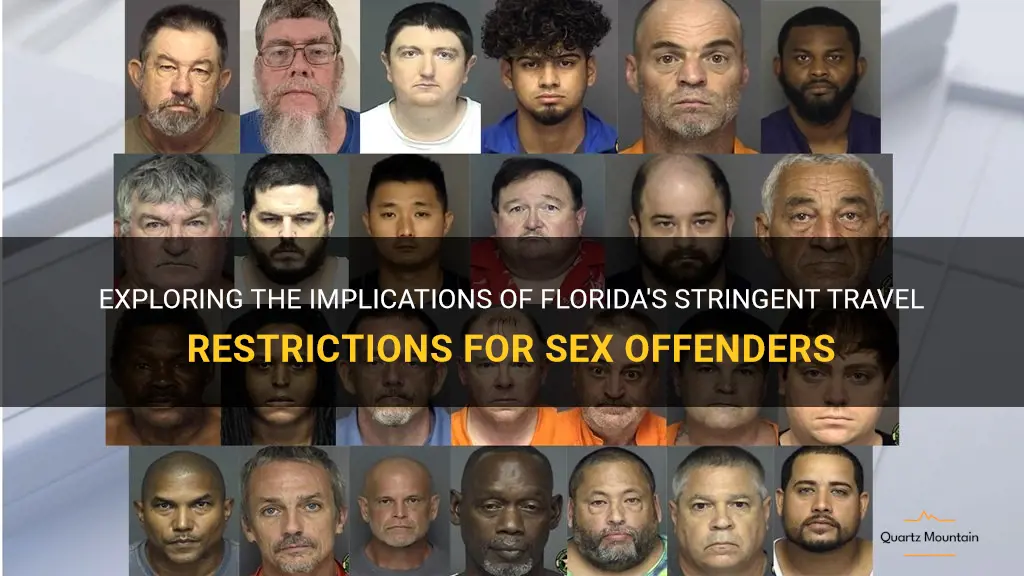
In an effort to protect communities and ensure public safety, many states have implemented various laws and regulations surrounding sex offender travel restrictions. One such state, Florida, has some of the strictest regulations in the country. These restrictions not only aim to monitor and track the movements of convicted sex offenders but also to prevent them from potentially reoffending or causing harm to vulnerable populations. In this article, we will delve into the details of Florida's sex offender travel restrictions, exploring their purpose, implications, and debates surrounding their effectiveness.
What You'll Learn
- What are the specific travel restrictions for sex offenders in Florida?
- Can sex offenders in Florida travel out of state?
- Are there any exceptions to the travel restrictions for sex offenders in Florida?
- How are the travel restrictions enforced for sex offenders in Florida?
- What are the potential consequences for sex offenders who violate the travel restrictions in Florida?

What are the specific travel restrictions for sex offenders in Florida?

In Florida, specific travel restrictions are imposed on sex offenders in order to ensure public safety and prevent them from reoffending. These restrictions are put in place to monitor and control the movements of convicted sex offenders, and to prevent them from coming into contact with potential victims.
One of the main travel restrictions for sex offenders in Florida is the requirement to register their address with the state. Under Florida law, sex offenders must update their address within 48 hours of any change. This allows law enforcement agencies and the public to know the whereabouts of sex offenders living in their community. Additionally, sex offenders are required to re-register their address every year on their birthday, even if there have been no changes.
Another travel restriction is the prohibition on residing within a certain distance of designated areas where children congregate, such as schools, parks, and playgrounds. In Florida, sex offenders are not allowed to reside within 1,000 feet of such areas. This restriction aims to minimize the risk of sex offenders coming into contact with potential victims, especially children.
In terms of travel within Florida, sex offenders are required to obtain permission from their local law enforcement agency before leaving the county of their residence for more than 48 hours. This is to ensure that law enforcement is aware of the whereabouts of sex offenders and can monitor their activities. Failure to obtain permission for travel can result in criminal charges.
When it comes to international travel, sex offenders in Florida may face additional restrictions. Depending on the terms of their probation or parole, sex offenders may be prohibited from leaving the country without prior approval from their supervising officer. This is to prevent sex offenders from fleeing the jurisdiction and avoiding the consequences of their actions.
It is important to note that while these travel restrictions are in place, they may vary depending on the specific circumstances and sentencing of each individual case. Sex offenders in Florida should consult with their legal representation or probation officer to fully understand the travel restrictions that apply to them.
In conclusion, Florida imposes specific travel restrictions on sex offenders to ensure public safety and reduce the risk of reoffending. These restrictions include the requirement to register their address, prohibition on residing near areas where children congregate, obtaining permission for travel within the state, and potential restrictions on international travel. Sex offenders should consult with legal professionals or their probation officers to fully understand and comply with these travel restrictions.
Pennsylvania's Latest Travel Restrictions: Everything You Need to Know
You may want to see also

Can sex offenders in Florida travel out of state?

Sex offenders living in Florida are subject to strict regulations and registrations. When it comes to traveling out of state, sex offenders are required to adhere to additional rules and restrictions to ensure the safety of communities they visit.
Under Florida law, sex offenders are classified into different tiers based on the severity of their offenses. Tier 1 offenders are considered to be the lowest risk, followed by Tier 2 and Tier 3 offenders who are considered to be higher risk. The rules regarding travel out of state differ for each tier.
Tier 1 offenders, who are considered to be the lowest risk, are not subject to any specific travel restrictions. They are free to travel out of state without notifying law enforcement or other authorities.
Tier 2 offenders, who have committed more serious offenses, are required to obtain written approval from the Florida Department of Law Enforcement (FDLE) before traveling out of state. The approval process typically involves submitting a written request to the FDLE, including detailed information about the planned travel dates, destinations, and purpose of the trip. The FDLE evaluates each request on a case-by-case basis and may approve or deny the travel.
Tier 3 offenders, who are considered to be the highest risk, have the most stringent travel restrictions. They are required to obtain written approval from both the FDLE and the local sheriff's office or probation officer before traveling out of state. Similar to Tier 2 offenders, Tier 3 offenders must provide detailed information about their planned travel and await approval from the authorities.
It is important to note that sex offenders in Florida are also required to maintain their registration in the state where they are visiting. This means that if a sex offender from Florida wants to travel out of state, they must also register with the local authorities in the state they are visiting. Failure to do so can result in serious legal consequences.
In addition to adhering to the travel restrictions, sex offenders must also comply with other requirements such as regular check-ins with law enforcement, notifying authorities of any changes in their address or employment, and keeping their registration and contact information up to date.
Sex offender registration laws can be complex and vary by state. It is crucial for sex offenders in Florida to familiarize themselves with the specific requirements and restrictions that apply to their situation before travelling out of state. Consulting with an attorney who specializes in sex offender law can provide guidance and ensure compliance with all applicable regulations.
Exploring Madrid Amid Travel Restrictions: A Guide to Navigating the New Norms
You may want to see also

Are there any exceptions to the travel restrictions for sex offenders in Florida?

Florida has some of the strictest laws when it comes to regulating the travel of registered sex offenders. These restrictions are in place to protect the members of the community, particularly children, from potential harm. However, there are a few exceptions to these travel restrictions that allow sex offenders in Florida to travel under certain circumstances.
One exception to the travel restrictions for sex offenders in Florida is for employment purposes. If a registered sex offender needs to travel for work and their employer provides written authorization, they may be allowed to travel outside of their designated area. However, this exception is subject to approval by the local law enforcement agency and must meet certain criteria.
Another exception is for medical treatment. If a registered sex offender needs to travel to receive necessary medical treatment that is not available within their designated area, they may be granted permission to travel. This exception also requires approval from the local law enforcement agency, and the sex offender must provide documentation from a licensed medical professional stating the necessity of the treatment.
Additionally, there may be exceptions to the travel restrictions for sex offenders in cases of family emergencies. If a registered sex offender needs to travel due to a family emergency, such as the illness or death of a family member, they may be allowed to do so. Again, approval from the local law enforcement agency is required, and the sex offender must provide documentation of the emergency situation.
It is important to note that these exceptions to the travel restrictions for sex offenders in Florida are not automatic. Each case is evaluated on an individual basis, and the decision to grant permission for travel is up to the local law enforcement agency. They will consider factors such as the nature of the offense, the length of time since the offense occurred, and the level of risk presented by the sex offender.
In conclusion, while Florida has strict travel restrictions for registered sex offenders, there are a few exceptions that allow for travel under certain circumstances. These exceptions include travel for employment, medical treatment, and family emergencies. However, approval from the local law enforcement agency is required, and each case is evaluated on an individual basis. Ultimately, the goal of these exceptions is to balance public safety with the rights of registered sex offenders.
Understanding the Current Travel Restrictions in Ontario: What You Need to Know
You may want to see also

How are the travel restrictions enforced for sex offenders in Florida?

Sex offenders in Florida face strict travel restrictions as part of their supervision and community monitoring requirements. These restrictions are designed to protect the community and prevent individuals with a history of sexual offenses from reoffending. The enforcement of travel restrictions for sex offenders in Florida involves a combination of legal regulations, monitoring systems, and collaboration between law enforcement agencies.
Florida has implemented several laws to regulate the travel of sex offenders. One of the key laws is the Florida Sexual Predators Act, which categorizes certain sex offenders as sexual predators and imposes additional travel restrictions on them. Under this act, sexual predators cannot establish a temporary or permanent residence within 1,000 feet of a school, childcare facility, park, or playground. Violation of this restriction is considered a felony offense.
To enforce travel restrictions, Florida has developed a sophisticated monitoring system called the Florida Department of Law Enforcement (FDLE) Sex Offender Registry. This registry includes detailed information about sex offenders residing in the state, including their names, photographs, addresses, and the nature of their offenses. The FDLE Sex Offender Registry is accessible to the public, allowing communities to be aware of nearby sex offenders and take necessary precautions.
In addition to the registry, Florida employs electronic monitoring devices to track the movements of certain high-risk sex offenders. These devices, such as ankle monitors, use GPS technology to monitor the offender's location in real-time. If a sex offender violates their travel restrictions, such as entering a prohibited area, an alert is triggered, and law enforcement is notified.
Enforcement of travel restrictions for sex offenders in Florida also involves collaboration between various law enforcement agencies. Local police departments, county sheriff's offices, and state law enforcement agencies work together to ensure sex offenders comply with the travel restrictions imposed on them. Through regular checks and monitoring, law enforcement can detect violations and take appropriate action, which may include notifying probation officers, initiating investigations, or making arrests.
It is important to note that the effectiveness of travel restrictions for sex offenders relies on the cooperation and compliance of the offenders themselves. Failure to obey travel restrictions can lead to severe consequences, including revocation of probation or parole, additional criminal charges, and imprisonment. By strictly enforcing travel restrictions, Florida aims to create safer communities and minimize the risk of sexual offenses.
In conclusion, travel restrictions for sex offenders in Florida are enforced through a combination of legal regulations, monitoring systems, and collaboration between law enforcement agencies. These restrictions aim to protect the community by preventing sex offenders from establishing residences near sensitive areas. The Florida Sexual Predators Act and the FDLE Sex Offender Registry play vital roles in regulating and monitoring the travel of sex offenders. Additionally, electronic monitoring devices and the efforts of law enforcement agencies help ensure compliance and detect any violations. By imposing and enforcing these travel restrictions, Florida strives to reduce the risk of sexual offenses and maintain safer communities.
Unpacking Rhode Island's Travel Restrictions: What You Need to Know
You may want to see also

What are the potential consequences for sex offenders who violate the travel restrictions in Florida?

Sex offenders who violate travel restrictions in Florida can face serious consequences. In order to protect the community and prevent these individuals from committing further crimes, Florida has implemented strict laws and regulations regarding the movements and activities of sex offenders.
Sex offenders are required to comply with a number of restrictions, one of which is related to their travel. They are prohibited from traveling to certain areas, such as schools, parks, and playgrounds, where children are likely to gather. Violation of these travel restrictions is a serious offense and can result in severe penalties.
The potential consequences for sex offenders who violate travel restrictions in Florida can include imprisonment, fines, and even a lengthening of their probationary period. The severity of the consequences depends on the nature and extent of the violation, as well as the offender's history.
If a sex offender is found guilty of violating travel restrictions, they may be sentenced to a period of imprisonment. This can range from a few months to several years, depending on the specific circumstances of the case. In addition to imprisonment, offenders may also be required to pay fines. The amount of the fine can vary, but it is typically substantial, as the courts aim to deter further violations.
Furthermore, violating travel restrictions can lead to a lengthening of the offender's probationary period. Sex offenders in Florida are usually required to be on probation for a substantial period of time after their release from prison. If they are found to have violated their travel restrictions, this probationary period can be extended, meaning that they will be subject to monitoring and supervision for a longer period of time.
In addition to these legal consequences, sex offenders who violate travel restrictions may also face social stigma and ostracization. The knowledge that they have disregarded the safety of the community, particularly children, can result in a loss of trust and the alienation of friends, family, and community members.
To ensure compliance with these travel restrictions, Florida law enforcement agencies closely monitor the activities of sex offenders. They use various tools, such as electronic monitoring devices and regular check-ins, to ensure that offenders are staying within the boundaries of their restrictions. Any violation detected during these checks is reported to the appropriate authorities, who then take the necessary legal steps.
In conclusion, sex offenders in Florida who violate travel restrictions face a range of potential consequences, including imprisonment, fines, probation extension, and social stigma. These consequences are implemented to safeguard the community and discourage sex offenders from engaging in illegal activities. It is crucial for sex offenders to understand and adhere to the travel restrictions imposed upon them to avoid the serious ramifications that can occur as a result of non-compliance.
Exploring North Carolina: Understanding the Current Travel Restrictions and Requirements
You may want to see also
Frequently asked questions
Yes, sex offenders in Florida are allowed to travel out of state. However, they must comply with certain requirements, such as notifying their local law enforcement agency about their travel plans and providing information about their destination and duration of stay.
Yes, there are restrictions on where sex offenders can travel within Florida. They are generally prohibited from living within a certain distance of schools, daycare centers, parks, and other locations where children regularly gather. Additionally, they must comply with any specific travel restrictions imposed by their probation or parole officer.
If a sex offender fails to comply with travel restrictions, they could face legal consequences. These consequences may include probation violations, additional restrictions on their travel, or even revocation of their probation or parole. It is important for sex offenders to understand and comply with all travel restrictions imposed upon them.
In some cases, sex offenders may be able to have their travel restrictions lifted. This usually requires demonstrating good behavior and successfully completing any required treatment programs. However, the final decision is made by the court or probation officer overseeing the case, and each situation is evaluated on a case-by-case basis.







